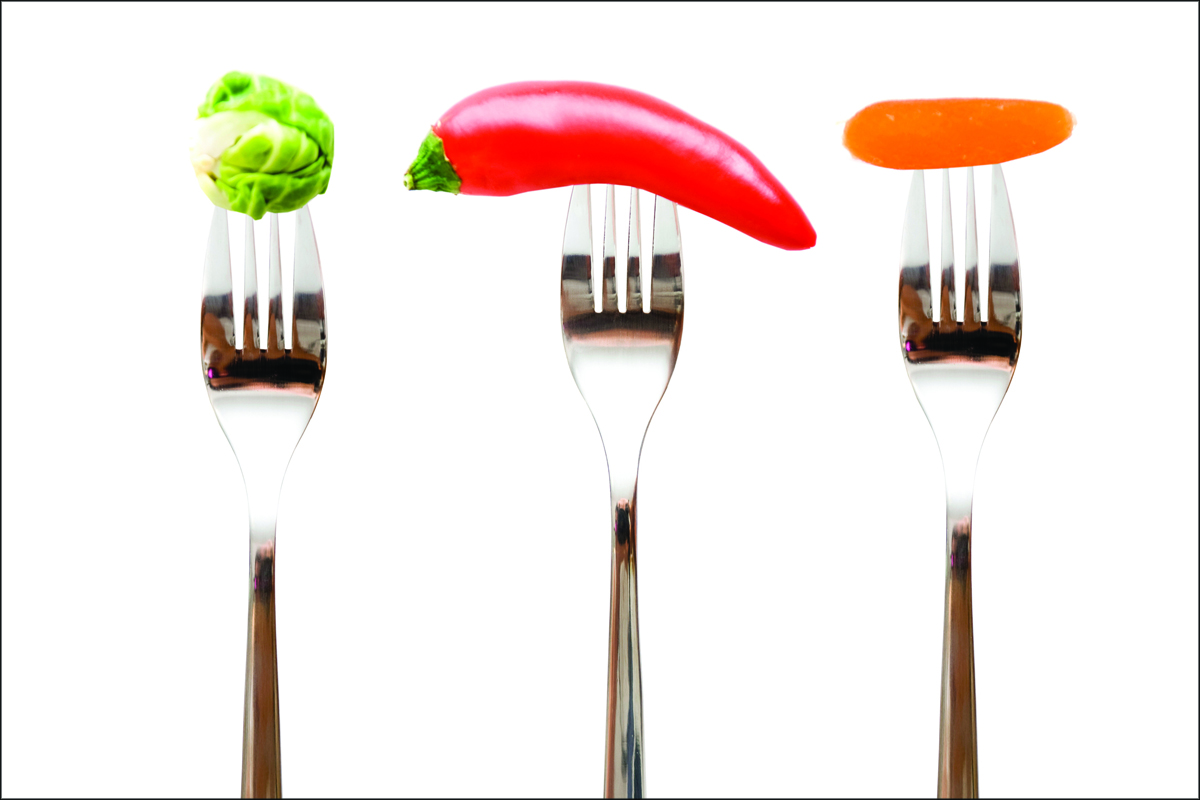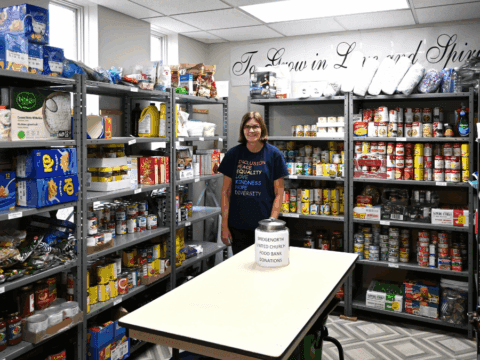Had I thought about any of this very clearly at first, what I am about to say might sound like bragging. But I didn’t. There wasn’t much pre-meditation involved. It was almost by accident that I began my life as a vegan exactly as I would now advise anyone to begin theirs.
It started with Christmas.
You may unsubscribe from any of our newsletters at any time.
And what happened was what always happens: I did no shopping.
I have on one or two occasions experienced the slightly awkward moment on Christmas morning when the gifts are finally all opened and it becomes apparent that none of them are from me. This general awareness is something I try to avoid, and sometimes, if I have the sense that the need for some kind of public admission is approaching, I have to think quickly. That’s what happened with the vegan thing. It just came to me — in the nick of time. The oranges were barely out of the stockings when I blurted out my entirely spontaneous idea. I told my 30-year-old daughter, who is a committed vegan, that her gift was six months of my being vegan. I said I’d give it a try.
I wasn’t worried about backsliding. No matter how tempting the Stilton or brisket or bucket of chicken wings, I was confident I would stick to my tofu and almond milk. There is nothing casual about a father’s promise to a daughter, just as there is nothing casual about my daughter’s commitment to doing more or less the opposite of what the animal agriculture industry would like her to do.
When Caroline read an early draft of this article she said she worried that it wouldn’t make people angry enough. Not that she is an angry person. Quite the contrary, actually. But there are some things that Caroline believes are worth getting angry about. Humankind’s relationship with the natural world is one of them. It is my experience that when the people who don’t usually get angry, get angry, you’d better sit up and listen. So there was no way I was going to break my promise — not on this subject, not to this daughter. “Giving it a try” meant I’d commit to six months of eating a vegan diet and then determine about how long-term this decision might prove to be.
Caroline appreciated the gesture. It was one for the good guys, so far as she was concerned — for while she is never preachy about her choice, she is very clear about her reasons. Vegans are generally of the view that the more of them there are in the world, the better off the world will be. And this is something about vegans that takes a little getting used to: they’re right.
You can argue all you want about whether humans are naturally carnivorous. You can talk about animal husbandry and ethnic culinary traditions until the cows come home. And yes, maybe a diet that needs to be supplemented with the B-complex vitamins that my daughter bought for me on Boxing Day (along with a jar of vegan protein powder) isn’t the diet on which the evolution of our species could have confidently relied.
Granted, all that.
But when I began to read about what I was getting myself into, I learned two facts that seem very personal to me. First, a diet based on plants uses a sixth the arable land as a diet based on meat, poultry and dairy. Second, in a few years, when (touch wood) I hit my three-score-and-ten, there will be three times more people on Earth than when I was born.
As pro-vegan arguments go, these two points, taken together, are the clincher. I almost feel responsible for how they add up — which may be because, in a way, I am.
I am a man of a certain age and of a certain generation who has lived a reasonably comfortable life in a relatively affluent region of the first world, which is another way of saying that for six decades I’ve eaten as much as I wanted to eat, whenever I wanted to eat it. I am not a glutton by North American standards, which means I am a glutton by most others. I have no doubt that in the category of unnecessary late-night pizza alone my footprint has been considerable. Families could live on what I ate as a teenager, although the families might wonder why there need to be so many trips to A&W and Dairy Queen.
So let’s just say that, like most people I know, I’ve already left my mark on planet Earth and am now wondering if there is anything I can do to pay off even a little of the environmental debt that I’ll be passing on. And, like most people I know, I had no idea how to do that — until I accidentally became a vegan.
Does my digestive system work better with a herbivore gatekeeper in charge? (It does.) Are my energy levels higher? (They are.) Am I losing weight? (I am.) Do I generally feel better? (I do.) But as reasons to be vegan, these personal improvements seem a little self-absorbed to me. The recipes I have tried — from Plenty and Oh She Glows cookbooks — are delicious and surprisingly satisfying. But, really. If I’m going to give up a butterflied leg of lamb barbecued with chèvre, fresh Italian parsley, garlic and olive oil, it’s going to have to be for better reasons than becoming more trim.
“Because we all liked cheeseburgers so much” is going to sound pretty stupid when humankind is hauled into the principal’s office and asked to explain how the planet got destroyed.
Alas, there’s no shortage of better reasons. Contributing to a more sustainable world being one. Not being a total dunce for another. “Because we all liked cheeseburgers so much” is going to sound pretty stupid when humankind is hauled into the principal’s office and asked to explain how the planet got destroyed.
Caroline gave a fist pump when I told her of my plan. But she was curious: when exactly would my six months begin?
There is a stretch of winter during which any kind of abstinence seems out of the question to me. Things are already bad enough. Why give up the pleasure of the warm, salty aroma of Marcella Hazan’s recipe for braised pork loin Bolognese drifting from the kitchen on a day when you’ve had to shovel the walk three times? When snow is being driven into sleet by the howling gales of February, why deny yourself the pleasure of Nigel Slater’s potatoes (“rustling, crusty edges and melting interior”) just because he cooks his in drippings from the roast?
A northern winter, even a weirdly mild one, is, in itself, the kind of challenge that suggests the wise postponement of other challenges. The days are so short and so lacking in any tomato worth eating that, the balmy breezes of El Niño notwithstanding, the weather might as well be freezing cold. St. Augustine was dealing with a different, but comparable context. Make me chaste, he prayed. But not yet.
And so, my immediate post-winter-solstice continued unabated: from the white and dark meat and the sage and sausage stuffing of Christmas dinner, to the sirloin tip of New Year’s Eve, to the bacon and eggs of a January Sunday breakfast, to the grilled cheese sandwich of an early February lunch. I enjoy cooking, and so to help keep the shadows of gloom at bay, I learned the recipes for marinated sweet and sour fish and for roasted chicken with clementines (both from the Jerusalem cookbook) during the bleak midwinter. I continued to eat my customary half-ton of cheddar a month as the bare branches creaked. On black and frigid nights (usually around 2 a.m.), I kept showing up at the freezer to see if there was enough chocolate ice cream in the tub for me to eat half of it without anyone noticing.
In other words, my diet remained unaffected by my promise.
Until the colonoscopy.
Should you ask my daughter why she is vegan — or should you ask the same question of Adam See, her equally level-headed and smart, equally pleasant and healthy-looking, equally non-moralizing vegan boyfriend — the initial answer might be a shrug and something like, “Do you really want to know?”
Caroline, I’ve noticed, often changes the subject away from the topic of why she eats what she eats. That’s because she is so often called upon to explain why she is vegan at dinnertime. This can be unwise from a breezy banter-at-the-table point of view.
“One of the reasons vegans are so often dismissed,” she tells me, “is because the facts behind the choice to become one are so uncomfortable.” And it is this kind of dismissal that makes vegans think (correctly, I am starting to believe) that they are onto something. Vegans point out that the great struggles of our time — for gay rights, for women’s rights, for civil rights — all encountered the same snickering in their early slogging as the subject of animal rights does now. It was John Stuart Mill, the great English philosopher and political theorist, who identified the three stages of all great movements as 1) ridicule, 2) discussion and 3) adoption. And, as the existence of stages two and three would appear to indicate, stage one is a rhetorical device used by people who sense they may be dead wrong.
Vegans know how unpleasant a topic of dinner conversation the generally accepted practices of animal agriculture can be. That’s usually why they’re vegans in the first place. Things can be graphic and disturbing even before they start talking about intentionally broken legs, and injections of antibiotics and hormones, and animals forced to live a life that consists largely of squatting in their own feces. People can get quite churlish about this kind of thing — especially while they are eating capon or calf’s liver.
But if you press vegans in the spirit of genuine interest and curiosity and not in the spirit of what-about-leather-shoes-then, they will tell you that, yes, they believe that morally, ethically, environmentally, socially, economically and in terms of their own health, veganism is the best option.
Is there any proof of this? Well may you ask — perhaps with a forkful of rare tournedos Bordelaise poised skeptically in front of your doubtful frown. And actually, there is. Vegans can be very convincing about what proof they believe they have at hand.
Should they start by raising the subject of the clear-cutting of the Amazon rainforest to grow grain to feed livestock? Unless you actually are a Koch brother, this is not an activity that can be enthusiastically defended. Or should vegans jump directly to the fact that the United States could feed 800 million people with the grain used currently to raise livestock? Yes, I know. It is surprising, isn’t it? You may also be unaware that livestock and its attendant industry create 51 percent of greenhouse gases. Or that it takes 660 gallons of water to produce a single hamburger? Oh, and if you happen to be a non-smoking male you might be interested to know that vegans have a 16 percent lower risk of colorectal cancer than non-vegans.
The list goes on. And yet it’s Caroline’s and Adam’s dietary lifestyle that is thought to be eccentric.
Animal rights? How amusing, people so often say. How naive. Which gets us right back to John Stuart Mill’s first stage. “A vegan, eh? Where are your tattoos?”
Do chickens like to be jammed into a plastic box to do nothing but lay eggs all their lives? Do fish enjoy suffocating on the deck of a trawler? Do pigs suffer when they are hoisted upside down in a slaughterhouse, electrocuted and bled to death?
Take a wild guess.
The lame-brained-to-begin-with idea that animals exist in an entirely different realm of sentience than humans went out the window with Charles Darwin. Not that either the food industry or the general consumer of food products took much notice. But in terms of how we experience suffering there is lots of easily observed evidence (the rocker of a chair; the tail of a sleeping cat) to suggest humans enjoy no great distinction from other vertebrates when it comes to how we react to pain. If you want to imagine what a calf feels when it’s branded, you could do worse than to imagine what you might have felt, as a baby, with a red-hot iron applied firmly to your rump. Ditto, the force-fed goose. Ditto, the immobile milking cow.
Among my favourite childhood books were the dozen or so titles of the Doctor Dolittle series by Hugh Lofting. Doctor Dolittle, as you may recall, could talk with animals — and it was part of Lofting’s great success as a writer that he understood how much almost everybody would like to do exactly that. To a child, the idea of talking to animals is particularly compelling because it seems a capacity so within reach.
Children have an empathy with animals because they understand that they share something with them. Not words, alas. Not even thoughts. But children automatically intuit that human and non-human are what vegans call “subjects of a life.” This awareness fades, I guess, as we grow older and eat more roast veal with Roquefort-butter stuffing. Because what non-vegans would prefer not to think about during the entree is that there is an elemental level of experience that we share with the lamb that used to be the rack-of you are eating. It’s an uncomfortable truth. We may not be able to talk with animals as Doctor Dolittle did. But we can at least begin to imagine how they might just possibly feel about finding themselves standing in a corridor of feces after being wrenched from their mothers.
One of the most inconvenient of vegan truths is this: pain is a language humans and non-humans often share. It’s a bond we have. Ironically enough.
So, the debate on this point is not whether most of the animals we raise for food suffer. Of course they suffer. It’s not really possible to argue the contrary unless you are so far out in the rhetorical ozone you are also busy arguing there is no such thing as climate change. In which case you are going to be no help to anyone anyway. As a matter of fact, I’m going to take the argument labelled, “They don’t feel pain or terror or misery the way we feel pain or terror or misery” and put it right over here, in the same box as “America can get great again by building a wall across the Mexican border.” I’m sure there are stupider ideas. But I’ll have to do some research. Meanwhile, all you have to do is spend about 10 minutes on YouTube, and you’ll be adequately convinced of the horrors of slaughterhouses, egg factories and some mass dairy farming operations. (Spoiler alert: don’t go there if you want to continue enjoying sausages.)
No, the much less completely silly question to ask is whether animals need to suffer for us to live. Or, more to the point, whether they need to suffer for us to live better than we would have had they not. Suffered.
I’m no philosopher. But Adam is. He teaches philosophy at Brooklyn College in New York City. In a letter to his students that was published in The Walrus in October 2014, Adam put his own position clearly and simply: “I believe that I have a moral obligation to reduce as much suffering in the world as I can before I die.”
This is not the philosophy to which Ayn Rand subscribed. And that’s one of the reasons it’s good enough for me.
I much prefer the thinking of the English philosopher, Jeremy Bentham, whose famous principle of utility contends that the greatest happiness of the greatest number is the measure of the rightness or wrongness of any action.
As you will quickly surmise, if Bentham’s “greatest number” is expanded to include animals, we find ourselves, suddenly, on very thin ethical ice indeed. (Much the same thin ice, actually, as the kind his slaves must have wondered about when they heard Thomas Jefferson going on about all men being created equal.) Six million land animals die in the world every hour in the production of meat, dairy and eggs. That’s a great number. But not the greatest. It’s not close to the number of aquatic animals killed for food.
It may be that the legal issue of animal rights is about to become more important in the vegans’ struggle than the philosophies behind those rights. Slowly, almost reluctantly, the courts have begun to concede that the shift John Stuart Mill predicted is taking place. That’s because ridicule is seldom a convincing legal argument. And because the biblical directive of humankind’s dominion over every creeping thing doesn’t have the persuasive power that it once did.
It appears that as a society we are somewhere near the beginning of Mill’s second stage when it comes to animal rights: they are now worth discussing. And that’s a slippery slope — especially if you are a supplier to the food industry. Once you concede that animals have the right to not be absolutely and totally miserable every single second of their waking life, it’s hard to know where such concessions can stop.
It became evident to me that eating a hot dog is as much a political act as not eating one.
Getting back to Bentham, is it fair to include non-humans in calculating what the world’s greatest happiness might be? Does a cow, or a goat, or a pig, or a salmon, or a grain-fed, free-range chicken have a role in establishing what Bentham regarded as the fundamental axiom of the principle of utility: that the morality of any action can be assessed by deducting the aggregate suffering from the aggregate pleasure of all involved? Bentham, who lived on the cusp of the 18th and 19th centuries, was equivocal on the subject of animal husbandry: he conceded that the day may come when animals could no longer be justifiably killed for food.
Two hundred years later, we don’t actually need animals for food (which is an entirely different matter from liking them, or wanting them, or being culturally or religiously accustomed to using them). So can any suffering of a living creature be morally justified? Isn’t it all unnecessary?
This is where most vegans come in.
Adam introduced Caroline, and Caroline introduced me to one of the central tenets of animal rights: the equal consideration of interests (which is grounded in Bentham’s principle of utility).
In his 1979 book Practical Ethics, Australian philosopher Peter Singer argues that we must include all affected interests when calculating the rightness of an action and weigh those interests equally.
The italics are my emphasis, but I think they’re justified. Weigh those interests equally are the kind of words that come with italics built-in — because they can entirely change the way most of us think of the world. They represent a true game-changer of an idea. And simply put, it’s this: the pilgrim’s interest does not automatically trump the turkey’s. In fact, the turkey’s interest in remaining alive might just, in this new order, outweigh the pilgrim’s apparent inability to do more interesting things with root vegetables.
Once these kinds of ethical arguments began to swirl around in what I like to think of as a reasonably fair-minded brain, and once I took the perilous state of the Earth into account, it became evident to me that eating a hot dog is as much a political act as not eating one. It’s a choice, and what I’m beginning to learn is that it’s a pretty clear one. You can be over there with the interesting looking young people who are enjoying a dinner of lentils, avocado and roasted yams. Or you can be with the multi-billion-dollar industry that pretty consistently put its own interests ahead of health, the environment, social and economic justice — and way, way ahead of the interests of animals.
I feel uncomfortable about stating what option Jesus would choose were he preparing dinner among us today. But I think we can hazard a guess.
The colonoscopy represented an opportunity. That’s not something you get to say very often.
The purpose of a colonoscopy is to identify any polyps that may be developing on the inside of the bowel and get rid of them. Polyps do not necessarily become tumours, but all tumours begin as polyps. It’s important for someone my age, particularly important for someone my age whose mother had colon cancer, to have this done every few years. Which is a blessing. It’s not really something you want to do more than every once in a blue moon. The procedure itself, while not exactly dignified, isn’t so terrible, thanks largely to the excellent drugs. But two days of fasting and “preparation” are another matter. They are as close as I ever want to come to feeling like a nozzle on a fire hose.
This occurred almost two months after Christmas, and there was nothing untoward in the results. I got a clean bill of health. Dr. Harry Himal, of the Provis-Rudd Clinic in Toronto, told me I had the insides of a 40-year old, and even as the drugs wore off I held to the view that this was a compliment. But there I was, you see: empty. As empty as a looted sphinx.
That was when I thought of my promise to my daughter. And, reluctant though I was to admit it, I could see a case that could be made for there being no time like the present.
There is a tide in the affairs of men. And although giving up roast beef was probably the last thing Shakespeare had in mind, I could see I was being drawn to a point in my life where I could take something at the flood. Or not. Would a slate so blank present itself again anytime soon? In other words: it was pretty much now or never. That was clear.
On top of which, I was ravenously hungry. Anything — meaning anything that I can do at this late stage of the game to improve things so desperately in need of improvement — will probably taste good, I decided.
And you know what? It did.
Still does.













